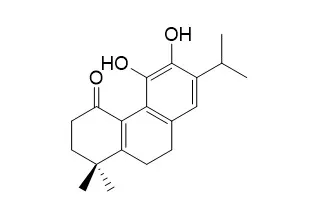| In vitro: |
| Phytomedicine: international journal of phytotherapy and phytopharmacology, 2016, 23(13):1671-1679. | | Sageone, a diterpene from Rosmarinus officinalis, synergizes with cisplatin cytotoxicity in SNU-1 human gastric cancer cells.[Reference: WebLink] | Chemotherapy resistance is a major obstacle for the effective treatment of cancers. Although several studies have described the anticancer properties of rosemary extract and its components, the detailed mechanisms of action are poorly understood.
METHODS AND RESULTS:
Activity-guided fractionation and repeated chromatographic separation of the n-hexane fraction of the aqueous methanol extract over silica gel, RP C18, and Sephadex LH-20 led to the isolation of three compounds. The structures of the compounds were determined using 1H, 13C, and two-dimensional nuclear magnetic resonance spectroscopy, mass spectroscopy, and infrared spectroscopy. The 3-(4,5-dimethylthiazol-2-yl)-2,5-diphenyl tetrazolium bromide assay was used to evaluate the cytotoxicity of these compounds. Cell cycle, apoptotic cell populations, and mitochondrial membrane potential were analyzed by flow cytometry. Western blot analysis was conducted to detect apoptosis-related proteins.An abietane diterpenoid, Sageone (1), an icetexane diterpenoid, (-)-barbatusol (2), and a monoterpene, (+)-verbenone (3), were identified. Of these compounds, Sageone (1) showed cytotoxicity against SNU-1 cells with an IC50 of 9.45 ± 1.33 µM. Sageone reduced the expression of Akt dramatically, as opposed to cisplatin, which increased phosphorylated Akt. Sageone combined with a subtoxic dose of cisplatin had synergistic effects on apoptosis induction in SNU-1 cells, as confirmed by calculating the combination index. Co-treatment was significantly more effective than monotherapy at reducing cell viability and inducing apoptosis, as determined by analyzing DNA fragmentation. The combined treatment of Sageone and cisplatin markedly reduced Akt expression and phosphorylation, accompanied by increases in cleaved caspase-3, -9 and PARP.This is the first time compounds 1 and 2 have been isolated from R. officinalis. Sageone induced apoptosis in SNU-1 human gastric cancer cells and notably enhanced the cytotoxicity of cisplatin in SNU-1 cells, which are known to be resistant to cisplatin.
CONCLUSIONS:
These findings suggest that Sageone represents a promising anticancer agent against gastric cancer that warrants further study. |
|






 Cell. 2018 Jan 11;172(1-2):249-261.e12. doi: 10.1016/j.cell.2017.12.019.IF=36.216(2019)
Cell. 2018 Jan 11;172(1-2):249-261.e12. doi: 10.1016/j.cell.2017.12.019.IF=36.216(2019) Cell Metab. 2020 Mar 3;31(3):534-548.e5. doi: 10.1016/j.cmet.2020.01.002.IF=22.415(2019)
Cell Metab. 2020 Mar 3;31(3):534-548.e5. doi: 10.1016/j.cmet.2020.01.002.IF=22.415(2019) Mol Cell. 2017 Nov 16;68(4):673-685.e6. doi: 10.1016/j.molcel.2017.10.022.IF=14.548(2019)
Mol Cell. 2017 Nov 16;68(4):673-685.e6. doi: 10.1016/j.molcel.2017.10.022.IF=14.548(2019)